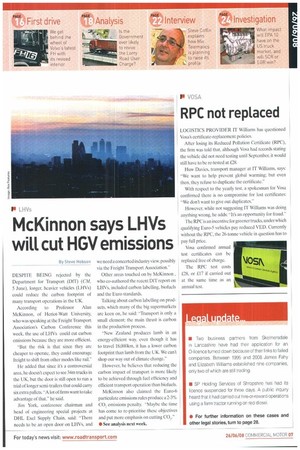McKinnon says LHVs will cut HGV emissions
Page 7

If you've noticed an error in this article please click here to report it so we can fix it.
By Steve Hobson
DESPITE BEING rejected by the Department for Transport (IINT) (CM, 5 June), longer, heavier vehicles (LHVs) could reduce the carbon footprint of many transport operations in the UK.
According to Professor Alan McKinnon, of Heriot-Watt University, who was speaking at the Freight Transport Association's Carbon Conference this week, the use of LHVs could cut carbon emissions because they are more efficient.
"But the risk is that since they are cheaper to operate, they could encourage freight to shift from other modes like rail."
He added that since it's a controversial area, he doesn't expect to see 34m trucks in the UK, but the door is still open to run a trial of longer semi-trailers that could carry six extra pallets. 'A lot of firms want to take advantage of that," he said.
Jim York, conference chairman and head of engineering special projects at DHL Exel Supply Chain, said: "There needs to be an open door on LHVs, and we need a concerted industry view, possibly via the Freight Transport Association."
Other areas touched on by McKinnon, who co-authored the recent Dft report on LHVs, included carbon labelling, biofuels and the Euro standards.
Talking about carbon labelling on products, which many of the big supermarkets are keen on, he said: "Transport is only a small element; the main thrust is carbon in the production process.
"New Zealand produces lamb in an energy-efficient way, even though it has to travel 18,000km, it has a lower carbon footprint than lamb from the UK. We can't shop our way out of climate change."
However, he believes that reducing the carbon impact of transport is more likely to be achieved through fuel efficiency and efficient transport operation than biofuels.
McKinnon also claimed the Euro-6 particulate emissions rules produce a 2-3% CO2 emissions penalty. "Maybe the time has come to re-prioritise these objectives and put more emphasis on cutting CO,"
• See analysis next week.








































































































































































